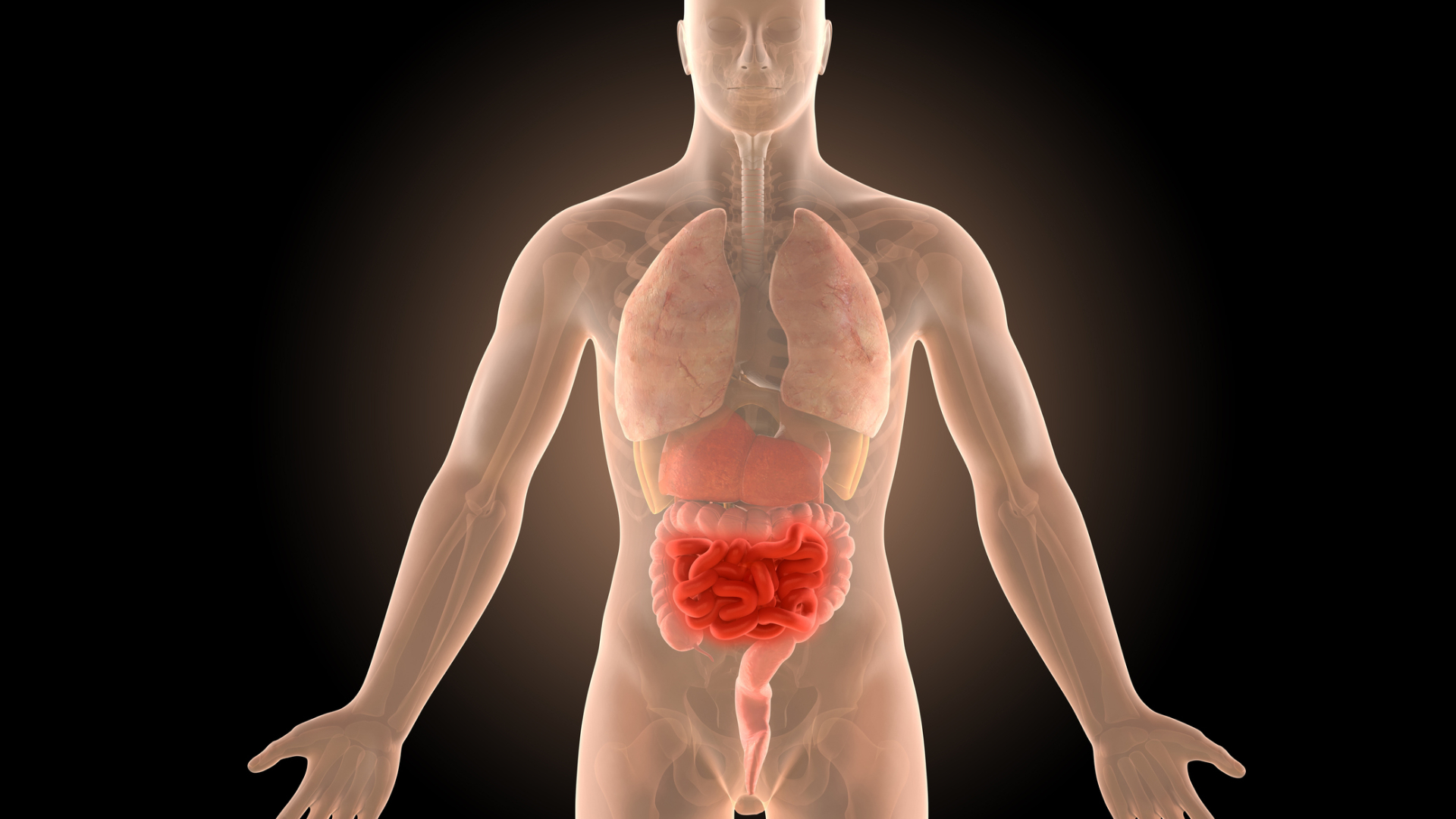Crohn's disease: Symptoms, diagnosis & treatment
Crohn’s disease is a chronic inflammatory bowel disease that involves inflammation in all or part of the digestive tract

Crohn’s disease is a form of inflammatory bowel disease (IBD) that impacts and suppresses the immune system, causing painful and life-affecting symptoms. Often, people with Crohn’s disease will experience abdominal pain, fatigue and unexplained weight loss, with one of the tell-tale signs being bloody and/or mucousy stools. While these symptoms can be alarming and painful, there are treatments available to manage the condition and to help patients to achieve disease remission.
Crohn’s disease can lead to nutritional deficiencies as the body struggles to absorb nutrients from food due to inflammation and poor gut motility. It is generally thought that Crohn’s disease occurs because the immune system mistakes harmless gut bacteria as a threat and responds in an attempt to protect the body.
We’ve spoken to experts to find out more about the causes, symptoms and treatment of Crohn’s disease, as well as factors that can worsen the condition. If you suspect you may be suffering from Crohn’s, it’s important to contact your doctor.
What is Crohn's disease?
Crohn’s disease is one of two kinds of inflammatory bowel disease, along with ulcerative colitis. A review in the Lancet journal suggests that Crohn’s disease cases are increasing worldwide. While it is an incurable condition, long-term remission can be achieved with careful treatment. The most severe cases have the potential to be deadly, due to complications, and surgical intervention is sometimes needed, such as a colostomy, which leaves patients with a stoma.
“Crohn’s disease is a chronic inflammatory bowel disease, which can affect any part of the gastrointestinal tract, from the mouth to the anus,” says Dr Deborah Lee, MD, from Dr Fox Online Pharmacy. “The condition tends to follow a relapsing and remitting course over a lifetime. It can be mild, moderate or severe, but often has a major effect on reducing the quality of life.”

Having worked for many years in the NHS, initially as a GP, and then as Lead Clinician for an integrated Community Sexual Health Service, Dr Deborah Lee now works as a health and medical writer, with an emphasis on women’s health. She is a menopause specialist.
Lee also says that intense inflammation can cause scarring in segments of the bowel, resulting in stricture formation from bands of scar tissue. As a result, the bowel wall becomes constricted, and the passage of gut contents is obstructed. Adhesions can occur, meaning the bowel walls become stuck together and fistulas may develop.
“These are narrow passageways leading from the bowel to the bladder, the vagina, or to the rectal or genital regions, which can ooze intestinal contents and may become infected, leading to abscess formation,” says Lee.
Get the world’s most fascinating discoveries delivered straight to your inbox.
Crohn's disease: Causes
According to Lee, the main causes of Crohn’s disease are:
- Genetics: Around three in 20 people diagnosed with it have a first-degree relative (mother, father, brother or sister) with the condition. If one identical twin has Crohn’s, the other twin has a 70% chance of developing it.
- Immune response: In Crohn’s, the body seems to recognise healthy bacteria in the gut as dangerous pathogens and mounts an unnecessary immune response. The immune system seems to become confused, as it can also initiate a less pronounced immune response at other sites in the body when this should be needed.
- Infection: Various bacterial infections, such as mycobacterium avium, certain types of E.coli and campylobacter infection, can trigger the onset of Crohn’s disease. It may be that a combination of factors including genetic susceptibility, other host factors and local viral or bacterial pathogens, together, culminate in the onset of the disease.
- Smoking: The risk of Crohn’s is doubled for smokers. The increased risk from smoking is even more pronounced in females than males. Smoking increases the risk of severe disease, stricture formation, and the need for surgery. Smokers are more likely to require steroids and higher doses and longer courses of immunosuppressants.
Crohn's disease: Symptoms
The most common symptoms of Crohn’s disease are:
- Lower abdominal pain (often right sided)
- Bloody diarrhea with mucus
- Bloating and flatulence
- Fever
- Loss of appetite
- Weight loss
- Anemia
- Perianal abscess or fistulas
- With bowel obstruction, they will also have nausea, vomiting and may have constipation

Hair loss is often associated with Crohn’s disease, although there is no certainty over why this is. A study in the Word Journal of Gastroenterology found it to be a common recurring symptom affecting head hair and eyelashes in particular. The study mentions that patients have anecdotally reported their medication as the source of this hair loss, but more research needs to be carried out to determine if this is the cause. It may also be attributed to nutrient deficiencies due to malabsorption.
Crohn's disease can also trigger secondary autoimmune conditions and other inflammatory diseases, according to another World Journal of Gastroenterology study. The study concludes that: “Immune mediated diseases were significantly more frequent in patients with IBD.”
Crohn's disease: Diagnosis
A review in the American Family Physician explains that the first step for diagnosing Crohn’s disease is to do a fecal calprotectin study, as this is the easiest way to rule out the disease in adults and children. This will generally be followed by an endoscopy and/or colonoscopy to confirm diagnosis and decide what treatment plan will be most helpful. The treatment plan will depend on the severity of the disease and where it is within the digestive system.
Roxana Ehsani, a registered dietitian nutritionist and national media spokesperson for the Academy of Nutrition and Dietetics, says that a visit to your family doctor is the first step to take in reaching a diagnosis. “A person may visit their doctor when they are experiencing chronic diarrhea, lots of stomach pain or cramping or poor appetite or rectal bleeding,” she says. “Your doctor will likely do a number of tests, such as a colonoscopy and spot inflammation in your gut.”

Roxana Ehsani is a board-certified specialist in sports dietetics and a National Media Spokesperson for the Academy of Nutrition and Dietetics. She holds a Bachelor of Science in Human Nutrition, Foods and Exercise from Virginia Tech and a Master of Science in Clinical Nutrition and Dietetics from the University of Pittsburgh and completed her dietetic internship at the University of Pittsburgh Medical Center.
Crohn's disease: Treatment
According to Lee, around one in five people with inflammatory bowel disease have such severe symptoms that they need surgery. “If a stricture occurs, the gut contents cannot move properly through the intestines – the passage of the gut contents can become blocked altogether,” she explains. “This is called obstruction and is a surgical emergency. There is a risk of the gut wall perforating, resulting in the contents spilling out into the abdominal cavity and causing peritonitis, which is life-threatening.”

A review in the World Journal of Gastroenterology indicates that lifestyle changes can significantly help with the progression of the disease and the maintenance of a state of remission. Stopping smoking in particular can help to control symptoms, and reduce the risk of complications in the disease and need for surgical intervention.
Another review in italian medical journal Annali Italiani di Chirurgia found that those with Crohn’s have an increased risk of developing cancers of the bowel and lymphoma, and lifestyle changes should be considered to mitigate this risk. These include staying a healthy weight, reducing red meat intake and quitting smoking.
Ehsani says that over-the-counter medications can be combined with prescription drugs in order to control symptoms of Crohn’s disease. “Treatments include anti-diarrhea medication to stop chronic diarrhea, steroids to reduce inflammation, and may include bowel rest at times, too. Patients may be prescribed a liquid diet for a few days to calm down the bowel,” she says.
This article is for informational purposes only and is not meant to offer medical advice.
Additional resources
- To learn more about Crohn's disease, visit the Crohn's & Colitis Foundation of America
- If you think you may have Crohn's, learn about the symptoms of Crohn's at the Mayo Clinic's website
- Find out more about treatments for Crohn's at the website for the National Institute of Diabetes and Digestive and Kidney Diseases

Lou Mudge is a health writer based in Bath, United Kingdom for Future PLC. She holds an undergraduate degree in creative writing from Bath Spa University, and her work has appeared in Live Science, Tom's Guide, Fit & Well, Coach, T3, and Tech Radar, among others. She regularly writes about health and fitness-related topics such as air quality, gut health, diet and nutrition and the impacts these things have on our lives.
She has worked for the University of Bath on a chemistry research project and produced a short book in collaboration with the department of education at Bath Spa University.


